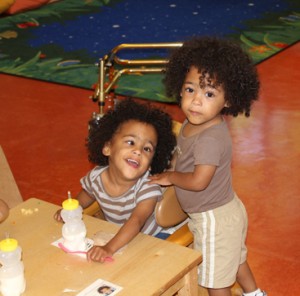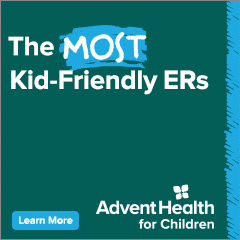UCP of Central Florida, A Special Program for Kids with Special Needs
UCP provides innovative programs that embody the “Together We Can!” motto
Sunny smiles, snuggly hugs, and on the verge of crawling… These joyous childhood milestones are a welcome sight for 39-year-old Stephanie, as she watches her two and a half-year-old twin boys these days. She has reason to celebrate, considering the prognosis this first-time mom had received from doctors after their birth: “Your sons may not survive, and if they do, they’ll likely be paralyzed,” the doctors had said. Though she had a difficult pregnancy, her children’s grave medical condition still came as a shock, and ultimately altered the plans she envisioned for her family. 
Quincy and Jackson were born at a mere 22 weeks and 3 days, after baby Jackson’s amniotic sac ruptured causing Stephanie to develop a dangerous blood infection. After the unexpected early arrival of the twins, Stephanie and her husband didn’t get to experience the typical sense of delight associated with preparing to go home with precious newborns. They didn’t have to figure out how to secure the car seats in her vehicle, or rush to select which matching outfits the boys would wear for the trip home. The twins were given a grim 20 percent chance of survival, each battling chronic lung disease, in addition to Quincy’s diagnosis of cerebral palsy, chronic kidney disease, and congenital heart disease. A daily battle for survival ensued, with the premature boys spending the first six months of their lives in the neonatal intensive care unit at Winnie Palmer Hospital in Orlando. But, amazingly, Quincy and Jackson beat the bleak odds. The twins endured multiple surgeries, adjusted to needed medications and, finally, were able to leave the hospital in their matching blue outfits, each snug for the first time in their car seats.
Stephanie, an Orlando resident, was fearful of the uncertain future, but had a background working with children with special needs and was prepared to take any steps necessary for her children. “A parent’s own fear can get in the way of what is best for their kid,” she says. “You have to accept that there is nothing wrong with children with special needs, and do everything you can to give them the best opportunities.”
Resources provided in her hospital discharge packet were instrumental in bringing her to the doors of UCP of Central Florida. For Stephanie, “the best opportunities” came through UCP’s remarkable services as the ‘experts for children with special needs’, becoming Quincy and Jackson’s one-stop shop for support, education and therapy. “UCP is invested in every child’s success,” she comments. “They give our kids the opportunity to excel.”
After joining the program at one year of age, those opportunities became available for Quincy and Jackson, and included direction from trained speech, physical and occupational instructors. “Seeing Quincy begin to pull himself up and Jackson taking his first step, helped me understand that UCP is helping my boys build a sense of independence,” Stephanie adds with pride.
Six UCP locations serve 2,400 families in the Central Florida area, impacting developmental achievements in children with autism, cerebral
palsy, Down syndrome, and spina bifida. The journey is enhanced with an environment of inclusive learning, with approximately 25 percent of the population comprised of children without disabilities. “We are proud to foster awareness and acceptance, celebrating individual differences, and teaching that these differences don’t matter” says Martha Mannarino, Senior Director of Strategic Marketing, UCP of Central Florida.
UCP started in 1955 when a group of parents advocated for their children with disabilities. Over the years, services of this charter school continued to expand, now offering programs from birth through young adulthood, including a college transition program and job internship placement. Because of high demand, a seventh location will open for the 2011-2012 school year. Children who attend a traditional public school can also receive therapy at UCP campuses.
“Our teachers are the thread that holds everything together at UCP. Their ability to work within a wide variety of developmental levels is key to student success,” states Martha.
“Our smaller classroom size offers that one-on-one attention needed by some,” adds Sandy Swearingen, Lead Instructor for Hunter, a 6-year-old child with Down syndrome.
Hunter’s mother, Philesha, once felt helpless when observing her son battle frustration because he lacked the ability to communicate verbally, often leading to physical outbursts. In less than a year, through speech and occupational therapy, Hunter recites his ABC’s, colors, and numbers in a classroom with an average of 7 to 10 children. In other cases, classes can accommodate up to 16 students with an added assistant instructor and educational volunteers. “It broke my heart that my child couldn’t express himself before coming to the UCP program,” says Philesha. “When I heard him say “Mama” for the first time this year, it felt like a miracle.”
often leading to physical outbursts. In less than a year, through speech and occupational therapy, Hunter recites his ABC’s, colors, and numbers in a classroom with an average of 7 to 10 children. In other cases, classes can accommodate up to 16 students with an added assistant instructor and educational volunteers. “It broke my heart that my child couldn’t express himself before coming to the UCP program,” says Philesha. “When I heard him say “Mama” for the first time this year, it felt like a miracle.”
A stay-at-home mother in Ocoee, Philesha also takes care of her other son, James, who is two years old. She’s learned from UCP how to better participate in the focused development of her sons. Today, Hunter is thriving with educational computer programs, which have led to his mastering various Wii games at home with his cousins! His progression has made him happier, eliminated physical outbursts, and positively impacted the entire family unit.
Tuition is free for eligible students with additional option plans, including coverage by commercial insurance and Medicaid, thanks to legislation including the Individuals with Disabilities Education Act (IDEA) and other amendments. Support from individuals and area businesses also impact the services and continual growth of UCP through major gift donations and two annual fundraising events.
Philesha points out that children with special needs can make incredible accomplishments if provided the needed encouragement. “Hunter is proving that he’ll reach his goals.” After seeing his transformation, Hunter’s mom envisions that he will be able to join non-disabled students at an Orange County elementary school in the near future.
While Quincy’s chronic kidney disease is currently managed with blood pressure medication, his future will likely entail a kidney transplant around 10 years of age. Until then, Stephanie is sure that Jackson will continue to watch over his twin brother, as he does now.
Many families in Central Florida are on the journey towards finding the best opportunities for their children with special needs. According to the Census Bureau, data collected in 2000 indicated that approximately 20.9 million American families had at least one member with a disability, including one or a combination of sensory, physical, mental, or self-care disabilities. UCP’s tagline, “Together We Can,” should be the motto for all families and communities to join in offering guidance to children with special needs.








